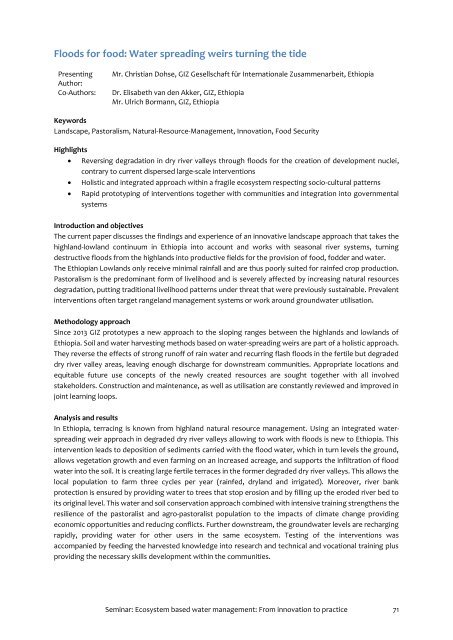2018 Abstract Volume
A compilation of the oral and written scientific presentations chosen to be part of World Water Week 2018 Seminars.
A compilation of the oral and written scientific presentations chosen to be part of World Water Week 2018 Seminars.
You also want an ePaper? Increase the reach of your titles
YUMPU automatically turns print PDFs into web optimized ePapers that Google loves.
Floods for food: Water spreading weirs turning the tide<br />
Presenting<br />
Author:<br />
Co-Authors:<br />
Mr. Christian Dohse, GIZ Gesellschaft für Internationale Zusammenarbeit, Ethiopia<br />
Dr. Elisabeth van den Akker, GIZ, Ethiopia<br />
Mr. Ulrich Bormann, GIZ, Ethiopia<br />
Keywords<br />
Landscape, Pastoralism, Natural-Resource-Management, Innovation, Food Security<br />
Highlights<br />
• Reversing degradation in dry river valleys through floods for the creation of development nuclei,<br />
contrary to current dispersed large-scale interventions<br />
• Holistic and integrated approach within a fragile ecosystem respecting socio-cultural patterns<br />
• Rapid prototyping of interventions together with communities and integration into governmental<br />
systems<br />
Introduction and objectives<br />
The current paper discusses the findings and experience of an innovative landscape approach that takes the<br />
highland-lowland continuum in Ethiopia into account and works with seasonal river systems, turning<br />
destructive floods from the highlands into productive fields for the provision of food, fodder and water.<br />
The Ethiopian Lowlands only receive minimal rainfall and are thus poorly suited for rainfed crop production.<br />
Pastoralism is the predominant form of livelihood and is severely affected by increasing natural resources<br />
degradation, putting traditional livelihood patterns under threat that were previously sustainable. Prevalent<br />
interventions often target rangeland management systems or work around groundwater utilisation.<br />
Methodology approach<br />
Since 2013 GIZ prototypes a new approach to the sloping ranges between the highlands and lowlands of<br />
Ethiopia. Soil and water harvesting methods based on water-spreading weirs are part of a holistic approach.<br />
They reverse the effects of strong runoff of rain water and recurring flash floods in the fertile but degraded<br />
dry river valley areas, leaving enough discharge for downstream communities. Appropriate locations and<br />
equitable future use concepts of the newly created resources are sought together with all involved<br />
stakeholders. Construction and maintenance, as well as utilisation are constantly reviewed and improved in<br />
joint learning loops.<br />
Analysis and results<br />
In Ethiopia, terracing is known from highland natural resource management. Using an integrated waterspreading<br />
weir approach in degraded dry river valleys allowing to work with floods is new to Ethiopia. This<br />
intervention leads to deposition of sediments carried with the flood water, which in turn levels the ground,<br />
allows vegetation growth and even farming on an increased acreage, and supports the infiltration of flood<br />
water into the soil. It is creating large fertile terraces in the former degraded dry river valleys. This allows the<br />
local population to farm three cycles per year (rainfed, dryland and irrigated). Moreover, river bank<br />
protection is ensured by providing water to trees that stop erosion and by filling up the eroded river bed to<br />
its original level. This water and soil conservation approach combined with intensive training strengthens the<br />
resilience of the pastoralist and agro-pastoralist population to the impacts of climate change providing<br />
economic opportunities and reducing conflicts. Further downstream, the groundwater levels are recharging<br />
rapidly, providing water for other users in the same ecosystem. Testing of the interventions was<br />
accompanied by feeding the harvested knowledge into research and technical and vocational training plus<br />
providing the necessary skills development within the communities.<br />
Seminar: Ecosystem based water management: From innovation to practice 71


















